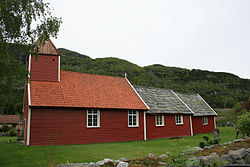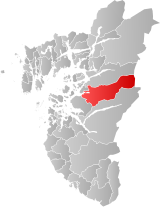Årdal, Rogaland
Årdal Municipality
Årdal herred | |
|---|---|
| Aardal herred (historic name) | |
 View of the Old Årdal Church | |
 Rogaland within Norway | |
 Årdal within Rogaland | |
| Coordinates: 59°09′10″N 06°09′39″E / 59.15278°N 6.16083°E | |
| Country | Norway |
| County | Rogaland |
| District | Ryfylke |
| Established | 1 Jan 1859 |
| • Preceded by | Hjelmeland Municipality |
| Disestablished | 1 Jan 1965 |
| • Succeeded by | Hjelmeland Municipality |
| Administrative centre | Årdal |
| Area (upon dissolution) | |
| • Total | 558 km2 (215 sq mi) |
| Population (1965) | |
| • Total | 864 |
| • Density | 1.5/km2 (4.0/sq mi) |
| Time zone | UTC+01:00 (CET) |
| • Summer (DST) | UTC+02:00 (CEST) |
| ISO 3166 code | NO-1131[1] |
Årdal is a former municipality in Rogaland county, Norway. The 558-square-kilometre (215 sq mi) municipality existed from 1859 until 1965. It stretched from the head of the Årdalsfjorden in the west to the county border in the east. It encompassed the southern half of the present-day Hjelmeland Municipality. The administrative centre of the municipality was the village of Årdal where the Old Årdal Church is located.[2]
History
[edit]The municipality of Aardal was established in 1859 when the large municipality of Hjelmeland was divided into two: Årdal in the south (population: 1,315) and Hjelmeland og Fister in the north (population: 3,084). On 6 March 1869, a small area of Aardal (population: 40) was transferred to the neighboring municipality of Hjelmeland og Fister. The spelling of the name was changed to Årdal in the early 20th century. On 1 January 1965 the municipality of Årdal was dissolved due to the recommendations of the Schei Committee. The majority of Årdal, with 743 inhabitants, was merged into Hjelmeland municipality once again. At the same time, the Sunngardene district (population: 121) was transferred to the neighboring Strand municipality.[3]
Old Årdal Church
[edit]Årdal is well known for the Old Årdal Church (Årdal gamle kirke) which received its final shape after expansion shortly after it was built in the early 17th century. The church was marked by the work of two local artists, the German-born painter Gottfried Hendtzschel (d. 1657 in Stavanger) and the craftsman Lauritz Snekker who was his student. The altarpiece and the pulpit was painted by Hendtzschel. They were both carved by Snekker who was also responsible for most of the carpentry work. The artistic efforts of Hendtzschel and Snekker within various churches in the vicinity formed a part of the Stranganger Renaissance (Stavangerrenaissance), the cultural period which peaked in the middle of the 17th century in the area around Stavanger.[4][5][6][7][8]
Name
[edit]The municipality (originally the parish) is named after the Årdalen valley (Old Norse: Árdalr) since it is the central geographical feature of the municipality. The first element is the genitive case of the word á which means "river" or "creek". The last element is dalr which means "valley" or "dale".[9] On 21 December 1917, a royal resolution enacted the 1917 Norwegian language reforms. Prior to this change, the name was spelled Aardal with the digraph "Aa", and after this reform, the name was spelled Årdal, using the letter Å instead.[10][11]
Government
[edit]While it existed, this municipality was responsible for primary education (through 10th grade), outpatient health services, senior citizen services, unemployment, social services, zoning, economic development, and municipal roads. During its existence, this municipality was governed by a municipal council of directly elected representatives. The mayor was indirectly elected by a vote of the municipal council.[12]
Municipal council
[edit]The municipal council (Herredsstyre) of Årdal was made up of representatives that were elected to four year terms. The party breakdown of the final municipal council was as follows:
| Party name (in Norwegian) | Number of representatives | |
|---|---|---|
| Local List(s) (Lokale lister) | 13 | |
| Total number of members: | 13 | |
| Party name (in Norwegian) | Number of representatives | |
|---|---|---|
| Local List(s) (Lokale lister) | 13 | |
| Total number of members: | 13 | |
| Party name (in Norwegian) | Number of representatives | |
|---|---|---|
| Local List(s) (Lokale lister) | 13 | |
| Total number of members: | 13 | |
| Party name (in Norwegian) | Number of representatives | |
|---|---|---|
| Local List(s) (Lokale lister) | 12 | |
| Total number of members: | 12 | |
| Party name (in Norwegian) | Number of representatives | |
|---|---|---|
| Local List(s) (Lokale lister) | 12 | |
| Total number of members: | 12 | |
| Party name (in Norwegian) | Number of representatives | |
|---|---|---|
| Local List(s) (Lokale lister) | 12 | |
| Total number of members: | 12 | |
| Party name (in Norwegian) | Number of representatives | |
|---|---|---|
| Local List(s) (Lokale lister) | 12 | |
| Total number of members: | 12 | |
| Note: Due to the German occupation of Norway during World War II, no elections were held for new municipal councils until after the war ended in 1945. | ||
See also
[edit]References
[edit]- ^ Bolstad, Erik; Thorsnæs, Geir, eds. (26 January 2023). "Kommunenummer". Store norske leksikon (in Norwegian). Kunnskapsforlaget.
- ^ Store norske leksikon. "Årdal – tidligere kommune i Rogaland" (in Norwegian). Retrieved 20 January 2016.
- ^ Jukvam, Dag (1999). Historisk oversikt over endringer i kommune- og fylkesinndelingen (PDF) (in Norwegian). Statistisk sentralbyrå. ISBN 9788253746845.
- ^ Henning Alsvik. "Gottfried Anderssøn Hendtzschel". Norsk kunstnerleksikon. Retrieved 1 September 2018.
- ^ "Årdal gamle kyrkje" (in Norwegian). Kirkenorge.no.
- ^ Froysaker, Tine (2003). Church Paintings of Gottfried Hendtzschel in Norway - Part I & II. Goteborg University. ISBN 91-7346-455-4.
- ^ Gundhus, Grethe (2005). I Guds og Bevaringens navn Fortellingen om tre altertavler og et øksemord. Kulturminner – en ressurs i tiden.
- ^ Kloster, Robert (1936). Stavangerrenessansen i Rogalands kirker. Stavanger Museum.
- ^ Rygh, Oluf (1915). Norske gaardnavne: Stavanger amt (in Norwegian) (10 ed.). Kristiania, Norge: W. C. Fabritius & sønners bogtrikkeri. p. 314.
- ^ "Norsk Lovtidende. 2den Afdeling. 1917. Samling af Love, Resolutioner m.m". Norsk Lovtidend (in Norwegian). Oslo, Norway: Grøndahl og Søns Boktrykkeri: 1000. 1917.
- ^ Den Nye rettskrivning : regler og ordlister (in Norwegian). Kristiania, Norge: Den Mallingske Boktrykkeri. 1918.
- ^ Hansen, Tore; Vabo, Signy Irene, eds. (20 September 2022). "kommunestyre". Store norske leksikon (in Norwegian). Kunnskapsforlaget. Retrieved 1 January 2023.
- ^ "Kommunevalgene 1963" (PDF) (in Norwegian). Oslo: Statistisk sentralbyrå. 1964. Retrieved 14 July 2020.
- ^ "Kommunevalgene og Ordførervalgene 1959" (PDF) (in Norwegian). Oslo: Statistisk sentralbyrå. 1960. Retrieved 14 July 2020.
- ^ "Kommunevalgene og Ordførervalgene 1955" (PDF) (in Norwegian). Oslo: Statistisk sentralbyrå. 1957. Retrieved 14 July 2020.
- ^ "Kommunevalgene og Ordførervalgene 1951" (PDF) (in Norwegian). Oslo: Statistisk sentralbyrå. 1952. Retrieved 14 July 2020.
- ^ "Kommunevalgene og Ordførervalgene 1947" (PDF) (in Norwegian). Oslo: Statistisk sentralbyrå. 1948. Retrieved 14 July 2020.
- ^ "Kommunevalgene og Ordførervalgene 1945" (PDF) (in Norwegian). Oslo: Statistisk sentralbyrå. 1947. Retrieved 14 July 2020.
- ^ "Kommunevalgene og Ordførervalgene 1937" (PDF) (in Norwegian). Oslo: Statistisk sentralbyrå. 1938. Retrieved 14 July 2020.

